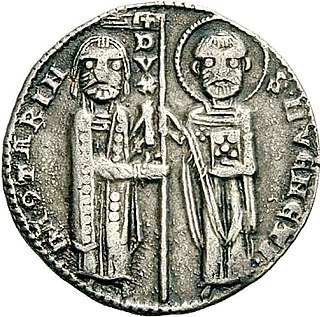In textual and classical scholarship, the editio princeps of a work is the first printed edition of the work, that previously had existed only in manuscripts. These had to be copied by hand in order to circulate.

Pietro Casola was a Catholic canon, born to a noble Italian family in Milan. He is most notable for the journal of his Pilgrimage to Jerusalem in the Year 1494. He served in Rome as a secretary attache to the Milanese Embassy in Rome and later as senior of the Cardinal Deacons of the Duomo. In 1467, Pope Paul II nominated him for the benefice of St. Victor at Corbetta as a reward for his service to the Catholic Church.

Jacopo Contarini (Giacomo) was the 47th Doge of Venice, from 6 September 1275 to his abdication on 6 March 1280.

Paolo Barbò da Soncino was an Italian Dominican philosopher and theologian.
Giacomo Badoaro (1602–1654) was a Venetian nobleman and amateur poet. He is most famous for writing the libretto for Claudio Monteverdi's opera Il ritorno d'Ulisse in patria (1640). He also provided librettos for the operas Ulisse errante by Francesco Sacrati (1644) and Elena rapita da Teseo (1653) by Jacopo Melani. He was a member of the Venetian intellectual circle, the Accademia degli Incogniti.
Bartholomew of Neocastro was an Italian jurist, and author of a chronicle called the Historia Sicula, which covers the years from 1250 to 1293.

Albertino Barisoni was an Italian writer and poet, and Bishop of Ceneda from 1653 to his death.
Andrea Barozzi was a Venetian nobleman. He served as official and military commander for the Venetian Republic.
Iacopo or Jacopo (I) Barozzi was a Venetian nobleman and official. He served as Duke of Candia for the Venetian Republic.
Iacopo, or Jacopo (II) Barozzi, was a Venetian nobleman and the first lord of Santorini in the Cyclades. He also occupied several high-ranking colonial positions for the Venetian Republic.
Andrea II Barozzi was a Venetian nobleman and lord of Santorini in the Cyclades and Admiral of Romania.
Giovanni Barbiano di Belgiojoso was an Italian nobleman and soldier.

The Querini family or Quirini was an old Venetian patrician family. They claimed an ancient Roman heritage, but their traceable history goes back to the 11th century. The family divided into many branches.

Enrico Narducci was an Italian librarian, bibliographer and paleographer.
Scipione Bargagli was a Sienese philologist, academician and scholar. He belonged to the Sienese School of philologists.
Andrea Barbazza was an Italian Marinist poet and literary critic.
Zaccaria Barbaro was a Venetian statesman and diplomat.
Paolo Barbo (1423–1509) was a Venetian patrician and statesman.

Paolo Barbo (1416–1462) was a Venetian patrician, diplomat and statesman. An educated humanist of the well connected Barbo and Condulmer families, he was the nephew of Pope Eugene IV and the brother of Pope Paul II.

Daniele Girolamo Dolfin or Daniele IV Dolfin was a Venetian statesman and military commander. He participated in the Morean War during the siege of Athens, the Battle of Mytilene, where he was heavily wounded, and the Battle of Samothrace, the last battle of the war. After the war he served as governor-general of the Venetian Ionian Islands (1699) and of the Terraferma (1706) and envoy extraordinary to Emperor Leopold I (1700). During the first phase of the Second Morean War he was Provveditore Generale da Mar, but was replaced after failing to prevent the loss of the Morea. His final appointment was as ambassador to Poland.










